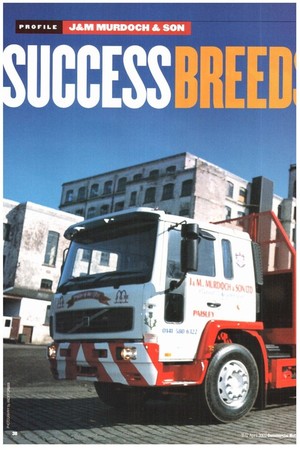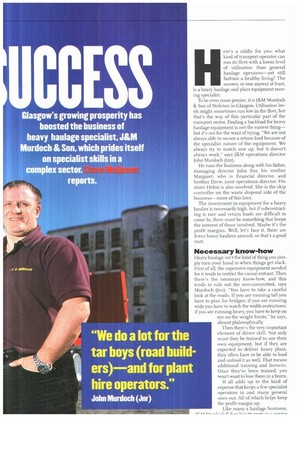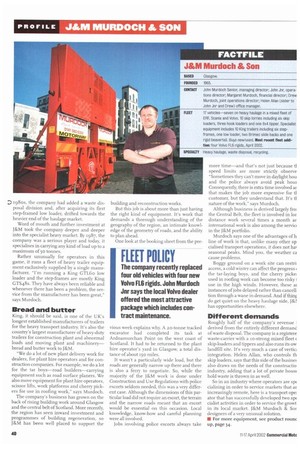UCCES S R EE D II C CESS
Page 38

Page 39

Page 40

If you've noticed an error in this article please click here to report it so we can fix it.
Glasgow's growing prosperity has boosted the business of heavy haulage specialist, J&M Murdoch & Son, which prides itself on specialist skills in a complex sector.
reports.
Here's a riddle for you: what kind of transport operator can run its fleet with a lower level of utilisation than general haulage operators—yet still fashion a healthy living? The answer, or one answer at least, is a heavy haulage and plant equipment moving specialist.
To be even more precise, it is J&M Murdoch & Son of Neilston in Glasgow. Utilisation levels might sometimes run low in the fleet, but that's the way of this particular part of the transport sector. Finding a backload for heavy haulage equipment is not the easiest thing— but it's not for the want of trying. "We are not always able to secure a return load because of the specialist nature of the equipment. We always try to match one up, but it doesn't always work," says J&M operations director John Murdoch (Jm).
He runs the business along with his father, managing director John Snr, his mother Margaret, who is financial director, and brother Drew, joint operations director His sister Helen is also involved. She is the skip controller on the waste disposal side of the business—more of this later.
The investment in equipment for a heavy haulier is necessarily high, but if subcontracting is rare and return loads are difficult to come by, there must be something that keeps the interest of those involved. Maybe it's the profit margins. Well, let's face it, there are fewer heavy hauliers around, so that's a good start.
Necessary lusovelsow
Heavy haulage isn't the kind of thing you simply turn your hand to when things get slack. First of all, the expensive equipment needed for it tends to restrict the casual entrant, Then there's the necessary know-how, and this tends to rule out the non-committed, says Murdoch (Jm), "You have to take a careful look at the roads. if you are running tall you have to plan for bridges; if you are running wide you have to watch the width restrictions; if you are running heavy, you have to keep an eye on the weight limits," he says, almost philosophically.
Then there's the very important element of driver skill. Not only must they be trained to use their own equipment, but if they are expected to deliver heavy plant, they often have to be able to load and unload it as well. That means additional training and licences. Once they've been trained, you won't want to lose them in a hurry.
it all adds up to the kind of expense that keeps a few specialist operators in and many general ones out. All of which helps keep the profit margin up.
Like many a haulage business, 0198os, the company had added a waste disposal division and, after acquiring its first step-framed low loader, drifted towards the heavier end of the haulage market.
Word of mouth and further investment at J&M took the company deeper and deeper into the specialist heavy market. By 1987, the company was a serious player and today, it specialises in carrying any kind of load up to a maximum of 5o tonnes.
Rather unusually for operators in this game, it runs a fleet of heavy trailer equipment exclusively supplied by a single manufacturer. "I'm running a King GTL6o low loader and the step-frames are mostly King GTS48s. They have always been reliable and whenever there has been a problem, the service from the manufacturer has been great," says Murdoch
Bread and butter
King, it should be said, is one of the UK's longest established manufacturers of trailers for the heavy transport industry. It's also the country's largest manufacturer of heavy-duty trailers for construction plant and abnormal loads and moving plant and machinery— bread and butter work to J&M.
"We do a lot of new plant delivery work for dealers, for plant hire operators and for construction companies. For example, we do a lot for the tar boys—road builders—carrying equipment such as road surface planers. We also move equipment for plant hire operators, scissor lifts, work platforms and cherry pickers for use in roofing work," says Murdoch.
The company's business has grown on the back of rising building work around Glasgow and the central belt of Scotland. More recently, the region has seen inward investment and programmes of building regeneration, so J&M has been well placed to support the building and reconstruction works.
But this job is about more than just having the right kind of equipment. It's work that demands a thorough understanding of the geography of the region, an intimate knowledge of the geometry of roads, and the ability to plan ahead.
One look at the booking sheet from the pre vious week explains why. A zo-tonne tracked excavator had completed its task at Ardnamurchan Point on the west coast of Scotland. It had to be returned to the plant hire operator's yard in Glasgow, a total distance of about 150 miles.
It wasn't a particularly wide load, but the roads are generally narrow up there and there is also a ferry to negotiate. So, while the majority of the J&M work is done under Construction and Use Regulations with police escorts seldom needed, this was a very different case. Although the dimensions of this particular load did not require an escort, the terrain and the narrow roads meant that an escort would be essential on this occasion. Local knowledge, know-how and careful planning were all involved.
Jobs involving police escorts always take more time—and that's not just because tl speed limits are more strictly observe "Sometimes they can't move in daylight hou and the police always avoid peak hour Consequently, there is extra time involved ar that makes the job more expensive for tl customer, but they understand that. It's tl nature of the work," says Murdoch.
Although business is derived largely fro; the Central Belt, the fleet is involved in lor distance work several times a month ar international work is also among the servici in the J&M portfolio.
Murdoch says one of the advantages of h line of work is that, unlike many other sp cialised transport operations, it does not hal seasonal peaks. Mind you, the weather ca cause problems.
Boggy ground on a work site can restri, access, a cold winter can affect the progress 1 the tar-laying boys, and the cherry pickel used in roofing work can become too risky use in the high winds. However, these al instances of jobs delayed rather than cancell. tion through a wane in demand. And if thinf do get quiet on the heavy haulage side, Pt.! has opportunities elsewhere.
Different demands
Roughly half of the company's revenue 1 derived from the entirely different demand of waste disposal. The company is a registere waste-carrier with a to-strong mixed fleet c skip-loaders and tippers and also runs its ow landfill site. It's very much a case of vertic integration. Helen Allan, who controls th skip loaders, says that this side of the busines also draws on the needs of the constructio industry, adding that a lot of private house hold waste is thrown in as well.
So in an industry where operators are spe cialising in order to service markets that ar increasingly remote, here is a transport ope: ator that has successfully developed two spc cialist activities in order to service the growt in its local market. (SEM Murdoch & Sor designers of a very unusual solution.
• For more equipment, see product rounc up, page 34.






















































































































































